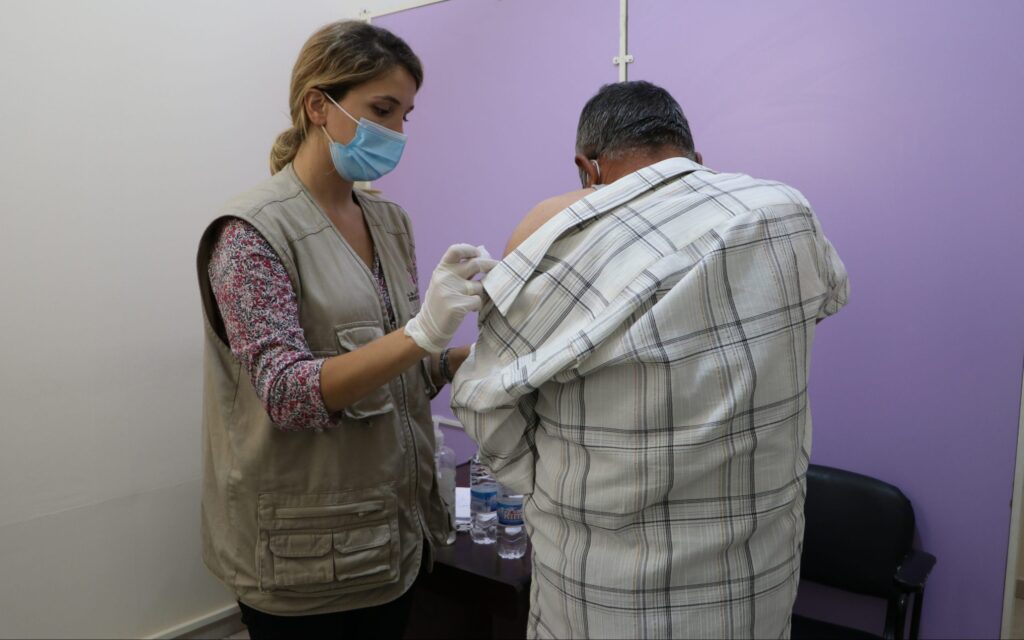Updates & Press
Blog Country Featured | November 3, 2021
Tackling COVID-19 Misinformation in Lebanon: Incre
Author | MedGlobalComms

[vc_row][vc_column][vc_column_text]By Valerie Nguyen, MedGlobal Policy Intern
More than 10 years of conflict in Syria has led close to 12 million Syrians to flee the country in search of safety, shelter, and opportunity. At least half of those who fled have relocated to neighboring countries, including Lebanon, which hosts the largest number of Syrian refugees at an estimated 1.5 million people, or over 20% of the total Lebanese population. Since the COVID-19 pandemic began, vulnerable populations in Lebanon have faced a multitude of challenges, including a worsening financial crisis and the Beirut port explosion, which has exacerbated circumstances for Syrian refugees.
Despite the inclusive approach Lebanon intended to adopt at the beginning of the COVID-19 vaccination rollout, refugees and internally displaced people (IDPs) in Lebanon face challenges in accessing the vaccine and are also hesitant to become vaccinated. Throughout the pandemic, there has been a level of distrust among Syrian refugees concerning the Government of Lebanon and subsequently, the Ministry of Health. Due to Lebanon’s strict residency policies, Syrian refugees informally living in Lebanon live in fear of arrest, detention, and deportation. Misinformation on COVID-19 spread online through social media platforms, has also contributed to the distrust of Lebanese government entities, reducing the number of eligible Syrian refugees to register for vaccinations.
According to a survey from the Iman Medical Center at the Ministry of Public Health in Lebanon, almost 37% of non-Lebanese respondents reported that they did not think the vaccine is safe and only 23% of non-Lebanese respondents said they are willing to take the vaccine. In addition, only 3% of the total Syrian refugee population pre-registered on the online vaccination platform, indicating low levels of confidence in the vaccine.

As of June 13th, 2021, more than 1,659,000 individuals are registered on the COVAX vaccination platform, IMPACT, of which only 42,000 Syrian refugees are registered. In response to the low vaccination rate and spread of COVID-19 misinformation, MedGlobal implemented a program to register Syrian refugees for vaccination and also administer vaccines in the Bekaa region. In partnership with Multi-Aid Programs (MAPs) and the United Nations High Commissioner for Refugees (UNHCR), the program aims to vaccinate 5,000 Syrians and register up to 15,000 Syrians online for vaccination. Our partner, MAPs, will communicate the project objective in their social clinics and offices to spread awareness to candidates who wish to be vaccinated, and the UNHCR will provide a clearance of each registered patient by medical staff and provide the AstraZeneca vaccine. MedGlobal’s Lebanon Logistics and Procurement Coordinator, Radiah Saleh, says that the main aim of the collaboration is to raise awareness among the Syrian refugee community, increase the number of COVID vaccinated cases, and establish a strong coordination and oversight mechanism between partners.
Most Syrian refugees live in high-density camps with poor access to water, sanitation, and hygiene services, leaving them at high risk of contracting COVID-19. Already, data provided by the United Nations shows that Syrian refugees have died from COVID-19 at a rate 3 to 4 times the national average. MedGlobal’s Program Manager, Dr. Tania Baban remarked that this project will not only help speed up the vaccination roll-out amongst the refugee population, but also help decrease the amount of hesitancy that has arisen from the spread of misinformation about the vaccine side effects. [/vc_column_text][/vc_column][/vc_row]


